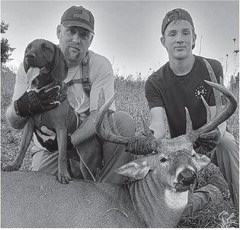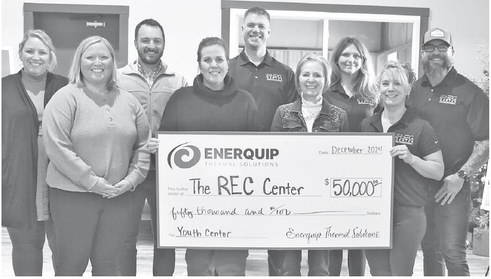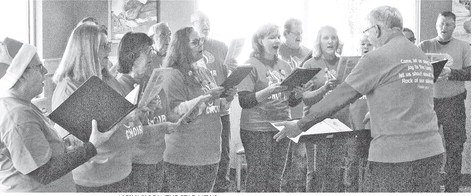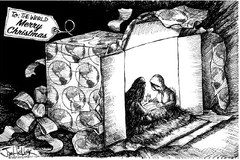Bavarian hounds are part of hunting stories


It’s something that most hunters have been through –– losing the animal they just shot on their hunt. In some cases, the animal only runs a few feet before dropping, others make it several hundred yards. Still others can cover long distances over days, and may, or may not, recover from the wound.
That’s where Freed’s Deer Taxidermy and Recovery in Cadott comes in. Owner Tory Freed owns two Bavarian Mountain Hounds and is on call, day or night, to help hunters attain their prey.
“We go out and find wounded animals for people,” said Freed.
If a hunter shoots a deer or a bear, and can’t find it, they give Freed a call. His dogs track an animal, regardless of size, and are bred specifically to find wounded animals, with only a couple hundred of the breed in the United States.
“If you don’t work them, they can be a very destructive dog,” said Freed, adding that though his two dogs are house pets, they get very excited when he puts on a certain pair of boots, which means going into the woods. “They’re one of those breeds, that you have to have a job for them.”
When animals are wounded, they give off a different smell, even through rain and snow, which is actually better for tracking, as the moisture stays lower to the ground.
“The dog can pick up that one different deer, compared to 100 others out there,” said Freed. “They’re tracking off the scent gland in the hoof, so they don’t need blood or anything like that. It’s pretty amazing what they can do.”
In the six years since Freed has done recovery tracking, his first hound, female Hilda, age 6, has more than 350 tracks to her credit, with 110 of those almost impossible to find – except for her.
“She’s a pro at what she does,” said Freed. “If it’s dead, we’ll go out there and find it. We’ve found a lot of deer that nobody would have found.”
Hilda’s counterpart, 8-month-old male Winston, is still learning the ropes.
“He’s already found two deer this year, but he’s young, he’s still in training,” Freed said. Freed, who was a dog breeder before starting his recovery and taxidermy business, fell in love with the Bavarian hounds when he stumbled across them at a trade show, but isn’t sure if he will breed Winston or not. Winston comes from a specialty German bloodline, which is hard to get as an American breeder or hunter, but, luckily for Freed, he’s part of a German club and was able to attain the pup.
With that club membership come some requirements to breed the male dog Freed purchased from Alabama, such as a lot of testing and possibly a need to breed the male to another club dog. It’s also likely the club might say Freed cannot breed Winston, so he would need to have the dog neutered.
Hilda is already spayed, although many people have expressed interest in her having puppies.
“She’s done so much work for me, she knows everything,” said Freed, who he thinks Hilda saved his life a couple times, by her awareness of the woods and the conditions they were in. “It’s pretty amazing what the dogs can do. It’s a good bond though.”
On the taxidermy side of Freed’s business, the last three years have been dedicated to building a clientele, and more recently, a new shop last year, a step up from his previous 15x15 space. His skills at the 25794 50th Avenue shop in Cadott, include mounting deer heads, European mounts, shoulder mounts and bears, while Freed does everything in-house, including the tanning.
That saves turnaround for Freed and hunters, since it could be a year before getting something back, with the recent supply chain issues. During his off-time, Freed works in the shop, where it’s usually just him, but he does get help from his 11-year-old daughter, Brienna, who goes tracking with him a lot, as well as his son, Nolan, 14, and his older son, who has a spot just for his welding projects.
“So, it’s kind of like a family thing we do,” said Freed. “I like to get the kids in- volved in it.”
During the rut season, Freed and the dogs put in 16-hour days in the woods, but for him, it’s not work, when he’s doing what he loves. Freed also wants to ensure that animals don’t suffer when they’re wounded and that hunters track down the kills, so the animal isn’t wasted.
“That’s one of the many reasons we do this,” he said. “That’s what hunting is about. We serve a purpose and a service, to help them out.”
Freed can be contacted for taxidermy or any time, to track an animal, by calling 715-559-7667.
“I’m part of the whole hunting story,” said Freed. “That special moment you’re part of, they’re going to remember this forever. They’ll be telling this at deer camp in 20 years, this story about how our dog found their deer.”




